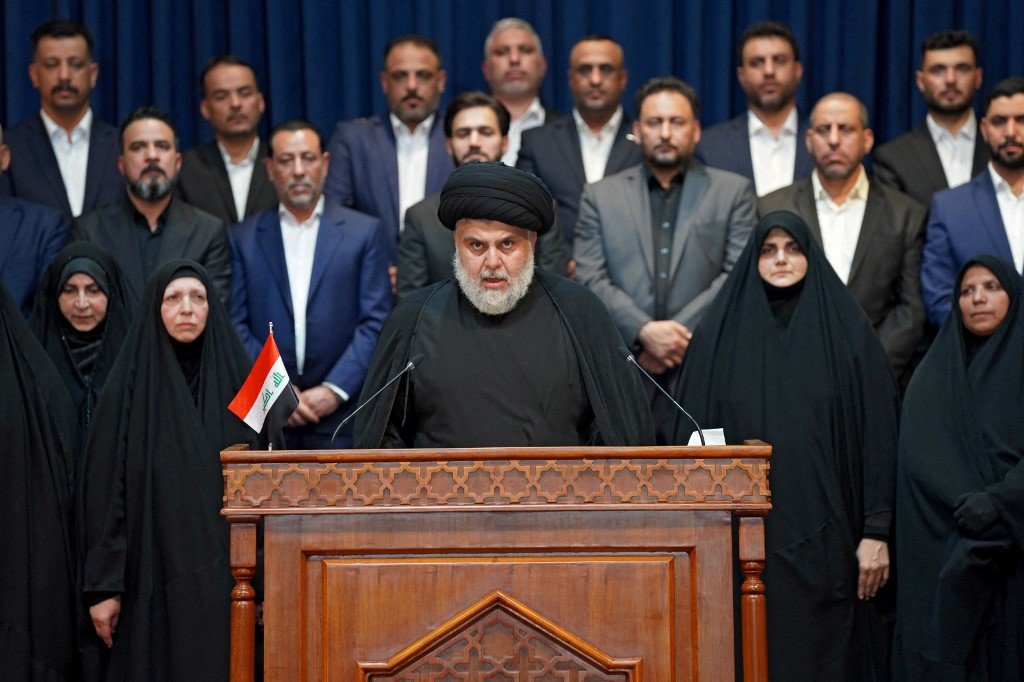After what has been widely referred to as the “political deadlock,” Iraq’s political process finds itself once again in a dark and suffocating tunnel. A tunnel it has been lost in for the past 19 years. Despite the promises of progress and change, Iraq’s leaders have been unable to pull the country out of its ever-tightening grip, where political ambition meets the harsh reality of a population suffocated by corruption and decay.
The political landscape in Iraq has long been a battlefield of competing factions, each more interested in preserving its own power than in solving the nation’s myriad crises. And now, with Iraq’s future hanging in the balance, political movements like the Sadrist movement, led by Muqtada al-Sadr, have capitalized on the situation. They ascended to prominence following what can only be described as an election charade—a farcical process in which less than 3% of Iraqis participated. Yet, despite such a low turnout, the Sadrists used this victory as their platform to enter parliament, dressed in the outward garbs of reform and humility, but all the while, their actions spoke otherwise.
Muqtada al-Sadr’s political theater began with sectarian rhetoric masked in the clothing of asceticism, a tactic that has long been part of his brand. However, one must not forget the blood-soaked history of his movement, particularly the tragic events of 2006, when over 1,500 Iraqis lost their lives in the violent aftermath of the destruction of the Samarra shrine. The Sadrists, despite their promises of reform, became mired in the very corruption they had once condemned. Under the pretext of implementing change, they looted government ministries and expanded their influence, turning the promises of reform into an insidious grab for power.
It wasn’t long before the political squabbling reached a boiling point. As the Sadrists secured seats in parliament, it was inevitable that the very forces they once allied with would soon become their targets. The “white tyrant” Nouri al-Maliki, the former prime minister, was the first to fall under Sadr’s crosshairs. The battle between the Sadrists and the so-called “loyalists” of the Shiite establishment, including figures like Hadi al-Ameri and Qais al-Khazali, became inevitable. The clash quickly escalated into a full-scale political drama, with political figures clashing like bulls in a ring.
What followed was the inevitable betrayal, the same betrayal that is a hallmark of Iraqi politics. The confrontation between al-Maliki and al-Sadr, two long-time political adversaries, culminated in Sadr falling victim to his own machinations. The political games he had been playing now turned against him. When the reality of his failure set in, Sadr, in an acrobatic display of retreat, pulled back from the public eye. He sought refuge in his usual escape—claiming spiritual retreat while dragging the heavy weight of shame that now defines his political legacy.
But Sadr’s retreat didn’t mark the end of his ambition. In the wake of his fall, he began to plot his next move. He would scorch the earth and burn everything in his path, as if the damage to Iraq’s political landscape hadn’t already been done. He urged his supporters, many of whom he himself described as ignorant, to rally behind him. His rhetoric was filled with promises of power, but his actions revealed the harsh reality: his movement, like so many before it, was ultimately about securing control for the few, not reforming the system for the many.
The chaos that has enveloped the Iraqi parliament is a microcosm of the broader political crisis gripping the country. Neither the Sadrists nor the loyalists have been able to address the core issues facing Iraq: corruption, poverty, unemployment, and sectarianism. Instead, the political theater plays out like a tragic farce, with each actor more focused on their own survival than on serving the needs of the people.
At the heart of it all, Iraq remains mired in poverty, hunger, and death. The people of Iraq are paying the price for a political system that has failed them time and time again. The promises of reform have been shattered by betrayal, greed, and corruption. And as the political elite continues to squabble for power, the average Iraqi is left to suffer the consequences.
As the saying goes, “Those who do not learn from history are doomed to repeat it.” Iraq, it seems, is trapped in a never-ending cycle of political dysfunction and failure. And unless the country’s leaders can break free from their own self-interest and work together to create meaningful change, the future will remain bleak. The people of Iraq deserve better, but for now, they remain at the mercy of a political system that has long since lost its way.
